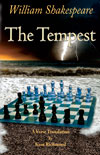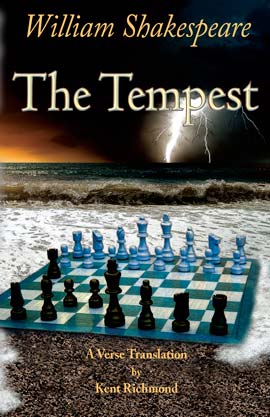Shakespeare Translations



The Tempest: A Verse Translation
William Shakespeare
Kent Richmond (translator)
ISBN-13 9780983637967
156 pages
Full Measure Press


Buy the Paperback at Amazon.com
Kindle eBooks
The Tempest: A Verse Translation
Excerpt
This excerpt from Act One, Scene Two is entirely in blank verse (unrhymed iambic pentameter). It shows how carefully the ENJOY SHAKESPEARE translations recreates the line structure of Shakespeare's plays.
Scene Two. On Prospero’s Island
[Enter PROSPERO and MIRANDA]
MIRANDA (daughter of Prospero)
If through your magic, dearest father, you’ve
Made the wild waters roar, now let them rest.
The sky looks set to pour down stinking tar,
But then the sea, climbing the cheeks of heaven,
Dashes the fire out. O, I have suffered
With those that I saw suffer! A splendid vessel,
Which no doubt had some noble creature in her,
Dashed all to pieces! O, their cries knocked hard
Against my heart itself! Poor souls, they perished.
Had I the power of a god, I would
Have sunk the sea beneath the earth before
It could have swallowed up the good ship and
The souls that were her cargo.
PROSPERO (former Duke of Milan and magician)
Calm yourself.
Be shocked no more. And tell your feeling heart
There’s no harm done.
MIRANDA
O, woe the day!
PROSPERO
No harm.
There’s nothing here I did not do for you,
For you, my dear one, you, my daughter, who
Are ignorant of who you are, of where
I’m from, and that I had a rank much higher
Than Prospero, master of this shack and just
As low a father.
MIRANDA
Wanting to know more
Has never entered in my thoughts.
PROSPERO
It’s time
That I inform you further. Help me to
Slip out of this magicians’s robe.
[Lays down his robe]
So there
You lay, my power.—[to Miranda] Wipe your eyes. Cheer up.
The dreadful wreck presented here, which touched
The very essence of compassion in you,
Was managed with such foresight through my art,
So carefully arranged, that not one soul—
No, nothing so much as a strand of hair—
Was lost to any creature you heard cry
Aboard the vessel you saw sink. Sit down.
You must learn more about this.
MIRANDA
Often you’ve
Begun to tell me what I am but stopped,
Concluding every fruitless inquisition
With “Wait. Not yet.”
PROSPERO
The hour now has come,
The perfect time to open up your ears.
Obey, and be attentive. Can you remember
Our life before we settled in this hut?
I do not think you can, for you were not
Quite three years old.
MIRANDA
Certainly, sir, I can.
PROSPERO
Remember what? A different house, a person?
Can you describe for me an image that
Your memory still holds?
MIRANDA
It’s far away,
More like a dream than something that assures
Me that my memory is true. Did four,
Perhaps five, women once take care of me?
PROSPERO
They did, and more, Miranda. But how is it
That this lives in your mind? What else is there
In the dark reaches and abyss of time?
If you remember anything from then,
You might recall our journey.
MIRANDA
But I don’t.
PROSPERO
Twelve years back, Miranda, twelve years back,
Your father was the Duke of Mílan* and
A powerful prince.
* [translator’s note] Today the English word for the Italian city Milan has the emphasis on the final syllable, but Shakespeare wants the word stressed on the first. Throughout the play, I add a stress mark to remind readers of the pronunciation needed for the verse to scan properly.
MIRANDA
Sir, are you not my father?
PROSPERO
Your mother was the paragon of virtue
And said you were my daughter. And your father
Was Duke of Mílan, you his only child,
A princess no less nobly born.
MIRANDA
O, heavens!
What foul play could it be that sent us here?
Or blessing, I suppose?
PROSPERO
Both, both, my girl.
Through foul play, as you said, we were cast out
But blessed enough to reach here.
MIRANDA
O, my heart bleeds
To think of all the grief I’ve caused for you
Of which I have no memory. Please, go on.
PROSPERO
My brother and your uncle, named Antonio—
Please try to comprehend a brother who’s
This treacherous—one whom next to you I loved
Most in this world, the one I put in charge
Of managing the state, which at that time
With all its provinces was at the top
And Prospero its main duke, his excellence
Renowned, his scholarship in art and science
Unparalleled. My time consumed by that,
I handed off the government to my brother
And grew a stranger to it, swept away,
Engrossed in studying magic. Your false uncle—
Are you still listening?
MIRANDA
Quite closely, sir.
PROSPERO
Having grown skilled in how to grant petitions,
How to deny them, who to sponsor, who
To put a leash on, he promoted or
Replaced—that’s right—or altered my appointments,
And holding keys to officer and office,
He set the tune that all hearts in the state would play
To one his ear preferred and now became
The ivy that concealed my princely trunk
And sucked the nutrients from me. You’re not listening.
MIRANDA
Good sir, I am!
Please, try to follow this.
My steering clear of worldly aims, with full devotion
To solitude and betterment of mind,
Though gaining more—seclusion has its price—
Than popularly thought,1 in my false brother
This stirred an evil nature, and my trust,
Like a good parent, was rewarded with
A falsehood, in proportion just as great
As my trust was, that is, without a limit,
Faith unconstrained. Advancing in this way,
Both from my income and the power that
A lord can bring to bear—like someone who
Has told so many lies against the truth
That his own memory’s now a sinner that
Will vouch for all he says—he soon believed
He was indeed the Duke, not just a proxy
Who in my absence wore the public face
Of royalty and privilege. His ambition growing—
You hearing this?
MIRANDA
Your tale, sir, would cure deafness.
PROSPERO
To raise the screen between the part he played
And he for whom he played it, Mílan he
Must rule. For me, poor man, my library was
A dukedom large enough, but he thinks I’m
Unfit for earthly business. Thirsting for
Some clout, he’s now “cooperating” with
The King of Naples, sends him annual payments,
Pays homage, has our crown defer to his,
And has our dukedom, once unbowed—poor Mílan—
Contort in a disgraceful curtsy.
MIRANDA
O heavens!
PROSPERO
Look at those terms, the outcome, then tell me
If this can be a brother.
MIRANDA
It’s a sin
To think such thoughts about my grandmother.
Good wombs can bear bad sons.
PROSPERO
Here are the terms:
This King of Naples, being an enemy
To me longstanding, hears my brother’s offer,
Which was, that in return for terms agreed to,
Of homage, tribute—I don’t know how much—
He’d clear at once down to the roots from all
The dukedom me and mine, and hand fair Mílan
And all its honors to my brother. Soon
A treacherous band, one midnight, picked by Fate
To fill this purpose, entered Mílan’s gates—
Antonio opened them—and in dead darkness,
These agents, just as planned, swept in and took
Us both, with you in tears.
MIRANDA
Such heartlessness!
I, who cannot remember crying then,
Cry over it again. My eyes will be
Wrung dry by this occasion.
PROSPERO
There’s still more,
And then I’ll tell you of the present business
That’s now upon us, without which this story
Would have no relevance.
MIRANDA
Why didn’t they
Just slay us at that time?
PROSPERO
Good question, lass!
My tale provokes it. Dear, they did not dare—
So dear the people’s love for me had grown—
To put a mark that bloody on this business.
In short, they painted over their foul deeds
With pretty colors, rushed us on a boat,
Took us out several miles, and put together
A rotten carcass of a tub—no riggings,
No tackle, sails, or mast; the rats themselves
Instinctively had left it. There they launched us,
To cry out to a sea that roared right back,
To sigh to winds that sighed back love and pity
Yet served to do us harm.
MIRANDA
O my, what trouble
I brought you then!
O no, an angel who
Protected me! Your smile infused me with
A fortitude from heaven, which when I
Adorned the sea with drops of salty tears,
When I groaned from the strain, it raised in me
The stomach to endure, to push against
Whatever might ensue.2
MIRANDA
How did we come ashore?
PROSPERO
By Providence divine.
We had some food and some fresh water that
A noble Neapolitan, Gonzalo,
Gave out of charity, who having been assigned
To supervise this plan, supplied us with
Rich garments, linens, gear, necessities,
Quite useful things. The gentleman he is,
Knowing I loved my books, he furnished me
With works from my collection that I prize
More than my dukedom.
MIRANDA
I would like someday
To see this man!
PROSPERO
It’s time for me to rise.
[He puts on his robe]
Sit there and hear the last of our sea sorrows.
Here on this island we arrived, and here
Have I, your schoolmaster, brought you more gain
Than princes will receive, who spend their hours
On frivolous things with tutors less attentive.
MIRANDA
Thank heavens for it! Now, please tell me, sir,
For it’s still pounding in my mind, why you
Have caused this storm at sea?
PROSPERO
I’ll say this much:
Through some strange chance, that generous goddess, Fortune,
Now my dear friend, has brought my enemies
Here to this shore; and through my premonition
I’ve found the zenith of my fate rides on
A star quite favorable, an influence
I should pursue and not neglect, for soon
My fortune will descend. No further questions.
You’ll want to sleep—a drowsiness that’s good,
So yield to it. I know you cannot help it.
[MIRANDA sleeps]
[to Ariel] Come to me, servant, come. I’m ready now.
Approach, my Ariel. Come.
[Enter ARIEL]
the scene continues...